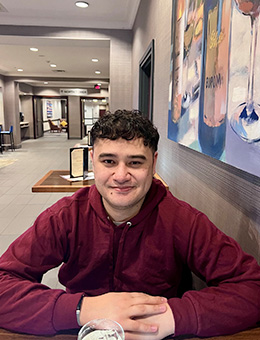This panel will explore immigration and mental health. First, Mazrouei will examine how 1.5-generation Iranian immigrants navigate a complex path between "here" and "there," seeking belonging while bridging home and host countries. Preliminary findings highlight how migration, political events, and COVID-19 impact their sense of belonging and well-being. This research could inform policymakers and community organizations, supporting immigrant youth's holistic well-being and fostering inclusive societies. Additionally, this panel will investigate a Mad Pilipinx method to engage with racialized mental health experiences through creative interventions. The panel aims to advance Mad Pilipinx studies, exploring creativity's role in critical disability and Mad studies. Villanueva's autoethnography and Esteban's choreographic narrative highlight personal and cultural narratives of madness and rest, contributing to discourses beyond biomedical understandings.
Shiva Mazrouei, MA
Shiva Mazrouei is a PhD candidate in the Health, Aging and Society Department at McMaster University. She is currently exploring 1.5 generation Iranians’ transnational conceptualization of belonging and its potential connectedness to place, emotions and mental well-being. Shiva completed her Master of Arts at McGill University and Sciences Po in Political Science, with a specialization in International Development Studies. She also holds a Bachelor’s degree in Political Science and Middle East Studies from McGill University. A lifelong learner and educator, Shiva has also carried out national research on made-vulnerable women’s access to the labour market with YWCA Canada, and researched, designed and facilitated various trainings focused on improving workforce access for marginalized groups.
Abstract: 1.5-generation immigrants (those who navigate prior to adulthood) navigate a complex path between "here" and "there," seeking belonging while pushing and bridging the boundaries of home and host countries. Since the 1979 Islamic revolution, Iran has witnessed significant migration waves, with its diaspora now living in almost all continents. Settling in cities like Toronto and Istanbul, Iranian immigrants face unique challenges in forging belonging amidst geopolitical complexities.
My narrative inquiry examines the experiences of 1.5 generation Iranians in the Greater Toronto Area (GTA) and Istanbul. Through a novel arts-based method of life mapping and semi-structured interviews, I explore their perceptions and experiences of belonging and its relationship to well-being, offering insights into the intersection of the two.
Preliminary findings suggest a clear relationship between participants' trajectories of belonging and well-being, highlighting the impact of events such as migration, recent political events, and the COVID-19 pandemic. Participants' diverse capacities to express their experiences of well-being provide insight into the unique complexities of both experiencing and communicating about well-being for this generation. Furthermore, the significance of contextual factors such as political era, international events, and family makeup in shaping the understanding and experience of belonging are highlighted. The narratives captured in this research underscore the diverse paths individuals take to navigate their sense of belonging, challenging its conventional notions. Some individuals embrace and forge their own definition of belonging beyond geographical boundaries, while others continue to oscillate between geographical, and emotional places.
This study contributes to understanding the intersection of belonging and well-being among 1.5-generation Iranians. By considering the complexities of their experiences, this research informs policymakers and community organizations, facilitating tailored interventions to support immigrant youth's holistic well-being and foster inclusive societies.
Walter Rafael Villanueva, MA
 Walter Rafael Villanueva is a PhD Candidate in the Department of English and has research positions at the Centre for Global Disability Studies and Dalla Lana School of Public Health at the University of Toronto. His research explores Asian Canadian narratives of madness and how Asian Canadian writers use storytelling as a counter or supplement to formal psychiatric diagnosis. His work has been published in Canadian Literature and Canada Watch.
Walter Rafael Villanueva is a PhD Candidate in the Department of English and has research positions at the Centre for Global Disability Studies and Dalla Lana School of Public Health at the University of Toronto. His research explores Asian Canadian narratives of madness and how Asian Canadian writers use storytelling as a counter or supplement to formal psychiatric diagnosis. His work has been published in Canadian Literature and Canada Watch.
Abstract: Walter Rafael Villanueva’s (Department of English, University of Toronto) presentation, “Crip Genealogies and Kinship in the Pilipinx Diaspora: Field Notes from my Mother’s Return,” takes the form of an autoethnography spanning Canada and the Philippines. This narrative paper traces his mother’s journey as a Filipina care worker in Canada who later develops vascular dementia and returns to the Philippines to make amends with her family, her relationship with whom has become fractured after she became disabled. Enmeshed within his mother’s story is his own experience as her Mad primary caregiver.
Jose Miguel Esteban

Jose Miguel “Miggy” Esteban is a dance/movement artist and educator based in Tkaronto/Toronto. Miggy’s artistic work develops improvisational practices of navigating mad and queer routes to embody Filipinx remembering and belonging. Currently a PhD candidate at the Department of Social Justice Education, OISE/University of Toronto, Miggy’s research and teaching is oriented through disability studies, black studies, and dance/performance studies. Influenced by disability arts and culture, black radical traditions, indigenous storytelling, and queer performance, Miggy’s dissertation project engages in embodied practices of improvisation to (re)interpret curriculum as a choreographic site for inspiring pedagogies of/through dance. Miggy’s work has been published in Canadian Theatre Review, Disability Studies Quarterly, Journal for Literary and Cultural Disability Studies, Liminalities: A Journal of Performance Studies, Theatre Journal, TOPIA: Canadian Journal of Cultural Studies, and in various edited volumes.
Abstract: Jose Miguel “Miggy” Esteban’s (Department of Social Justice Education, OISE/UofT) presentation, “Pahinga ka muna: Inspiring Mad (Un)Belonging through Diasporic Practices of Rest,” shares a choreographic narrative that traces the mad and queer routes of their Pilipinx diasporic inspirations. Through this paper/performance, Miggy embodies a somatic/dance practice inspired by the Tagalog term pahinga, which means to rest. Further tracing the roots of such rest by interpreting their movements through hinge–breath, Miggy returns to their breath as the gesture through which they navigate the Canadian multicultural expectations of Filipino belonging that always and already seem to gesture to queer and mad embodiments of Pilipinx unbelonging. It is by interpreting such contested choreographies of breath that Miggy’s offering attempts to access the radical nourishment, the ancient stories, of diasporic rest.
(A side profile of Miggy, who crouches amidst bushes and white flowers that recede blurrily into the background. Miggy’s fingers gently crawl up from a long-sleeved maroon shirt, over chin and lips, and toward a small ocean of black, wavy hair. The brown skin of Miggy’s cheek is caressed by the palm of a hand, supporting closed eyes that look down in contemplation.)
